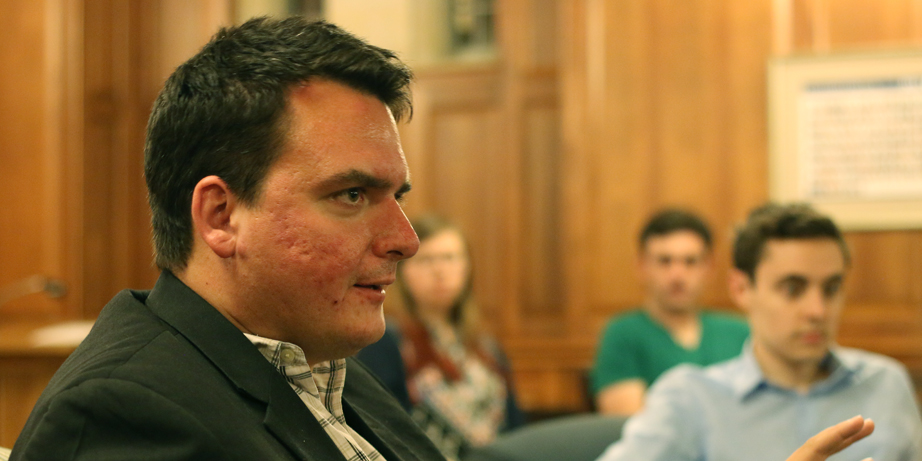
Mere hours after the former frontrunner for the Republican nomination for president exited the race, Yale students gathered to discuss national politics and the evolution of the news media with a journalist whose work influences the public’s picture of the national race.
That journalist was David Weigel, a reporter for the Washington Post who made his name by covering the U.S. elections of 2006 and 2008 and the “birther” movement. He joined the Yale College Democrats in the Branford Common Room last night to talk about the state of the presidential race. The timing was fortuitous, given Wisconsin Gov. Scott Walker’s announcement earlier in the evening that he would drop out of the race.
Weigel, who covered the Walker campaign closely in recent months, said Walker’s announcement did not come as a total surprise to political reporters. He said Walker never managed to recover from Donald Trump’s entry into the race, which he said hurt Walker’s own base of support.
“This was the kind of day we frankly look for, and we saw it coming,” he said. “You have a sense when you’re covering a campaign that it’s failing.”
The 2016 race was just one of several topics that Weigel and the attendees touched on throughout the talk. Much of the discussion focused on the changing face of journalism in the age of the Internet, where political blogs have proliferated and traditional daily papers have been forced to make severe layoffs.
Weigel said the duty of journalists is to add new information to the national discussion and avoid becoming a mouthpiece for the political campaigns on which they report.
“A lot of political journalism runs the risk of just being promotional material if it’s not skeptical, if it’s not trying to expose something they don’t to expose,” he said.
In response to a question about the rise of online media — news outlets like FiveThirtyEight and Vox, the latter of which is financed by venture capitalists — Weigel said traditional news organizations have been forced to change their attitudes towards production.
But he added that competition between news outlets might not be all that it is chalked up to be. Websites like Vox and FiveThirtyEight fulfill niches that are distinct from the large national newspapers like The Washington Post and The New York Times. And data journalists, like Nate Silver of FiveThirtyEight, have their shortfalls, too — many predicted that Donald Trump’s popularity would be only a short bubble, a forecast that has since proved incorrect.
For Sam Ungar LAW ’17, those remarks rang true.
“I think that there’s a meaningful difference between what Ezra Klein writes about at Vox, what Nate Silver writes about at FiveThirtyEight and what people like Weigel write about at the Post,” he said.
He added that traditional journalists like Weigel have the capacity to interact directly with voters, providing them with valuable insights that data journalists often lack.
Throughout the talk, Weigel emphasized the differences between Washington, D.C. and the remainder of the country — he tries to get outside of the Beltway area at least once a week, he said. These perspectives impressed other attendees, including Fernando Torres ’19.
“Something that really struck me is how he said that when something seems like it’s over in Washington, it might not be over in the rest of the country,” he said.
Interested in getting more news about New Haven? Join our newsletter!







